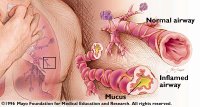Contact dermatitis
There are two types of contact dermatitis:
*
Irritant contact dermatitis (ICD). Caused by a chemical or substance that is naturally irritating to the human skin (e.g., cosmetics, detergents, soaps, food, medication, metals, plants). The most common form of contact dermatitis, it usually resembles a burn.
*
Allergic contact dermatitis (ACD). Caused by an allergic reaction. The reaction varies from a mild irritation to redness and open sores.
Symptoms of contact dermatitis include a red, raised rash on the skin that often itches. Diagnosis of the condition is based the skin’s appearance and the patient’s history of exposure to allergens or irritants.
In a majority of cases, treatment of this condition involves identifying and avoiding allergen triggers that cause contact dermatitis. Effective self-care treatment remedies include:
*
Calamine lotion and cool oatmeal baths to relieve itching
*
Cold compresses
*
Washing with cool, soapy water immediately after exposure
*
Moisturizers to help restore the skin’s normal texture
If contact dermatitis occurs frequently, an allergy specialist should be seen to help identify the underlying cause or rule out allergies. The physician may prescribe antihistamines and corticosteroid medications to treat any inflammation.













